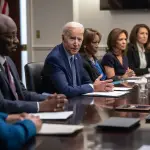In a startling series of events, a rally in Butler, Pennsylvania turned alarming when gunfire erupted nearby, prompting former President Donald Trump to reassure his supporters that he was unharmed. The situation quickly ignited debates about security protocols for presidential candidates, leaving many to wonder: who exactly is responsible for ensuring the safety of those seeking the nation’s highest office? As the dust settles on this potentially dangerous incident, scrutiny falls upon the current administration, law enforcement, and the protective measures in place.
Trump, ever the steadfast figure, took to social media to declare his safety soon after the chaos unfolded. His message was clear: he wouldn’t back down or be intimidated by threats against him. This assertion is as emblematic of his political persona as it is a rallying cry for his supporters, who have long perceived him as a figure standing against a tide of adversities. Yet, while Trump’s resilience is commendable, the underlying issues surrounding his security call for a much closer examination.
The rally shooting has called into question the effectiveness of the various agencies responsible for protecting political figures in America—agencies that range from the Secret Service to the Federal Bureau of Investigation (FBI). Many are asking whose fault it is that security seems to have lagged, especially during a heated election cycle. The chaos of the day reflects a deeper gap in accountability, as critics argue that while protective measures should be inexhaustible and cohesive, they often seem fragmented and ineffective.
Reflecting on past administrations, some commentators express nostalgia for earlier times when a clear chain of command existed. They reminisce about the leadership style of Ronald Reagan, where decisive actions were taken swiftly following any threat. In stark contrast, they assert today’s leaders appear aloof and unresponsive. As feelings of frustration swell, the concern mounts that without the proper oversight, those tasked with keeping public figures safe may be operating in a state of disarray, much like a comedy of errors, often referred to as the “Keystone Kops.”
This incident does more than just highlight security setbacks; it also brings to light the rising rhetoric surrounding political discourse in the nation. Some commentators point toward the vitriolic language used by both sides of the aisle. They are quick to note that over the past months, tensions have escalated, creating an environment where violent actions are increasingly seen as acceptable by some individuals. The motivations behind such actions, they argue, can often be traced back to media portrayals, inflammatory comments from public figures, and a general culture that seems to condone this kind of behavior.
As tensions rise and the nation heads toward what promises to be a fraught election season, many are urging fellow citizens to rise to the occasion. They stress the importance of being vigilant, involved, and proactive in influencing change for the better. With only 50 days to go until election day, there’s an increased call for citizens to mobilize, emphasizing that real change begins at the grassroots level. America thrives on the ideal of democracy, but it requires active participation to keep it from veering toward chaos.
In the aftermath of the Butler rally, Americans find themselves grappling with questions of security, responsibility, and political safety. As we navigate this tumultuous political landscape, citizens must reflect on the necessary steps to not only safeguard their voices in the political arena but to ensure that the systems in place to protect them are more robust than the jokes of yesteryear. In the end, it’s a collective effort that will bring about change, and it starts with each of us being engaged, informed, and ready to act.




